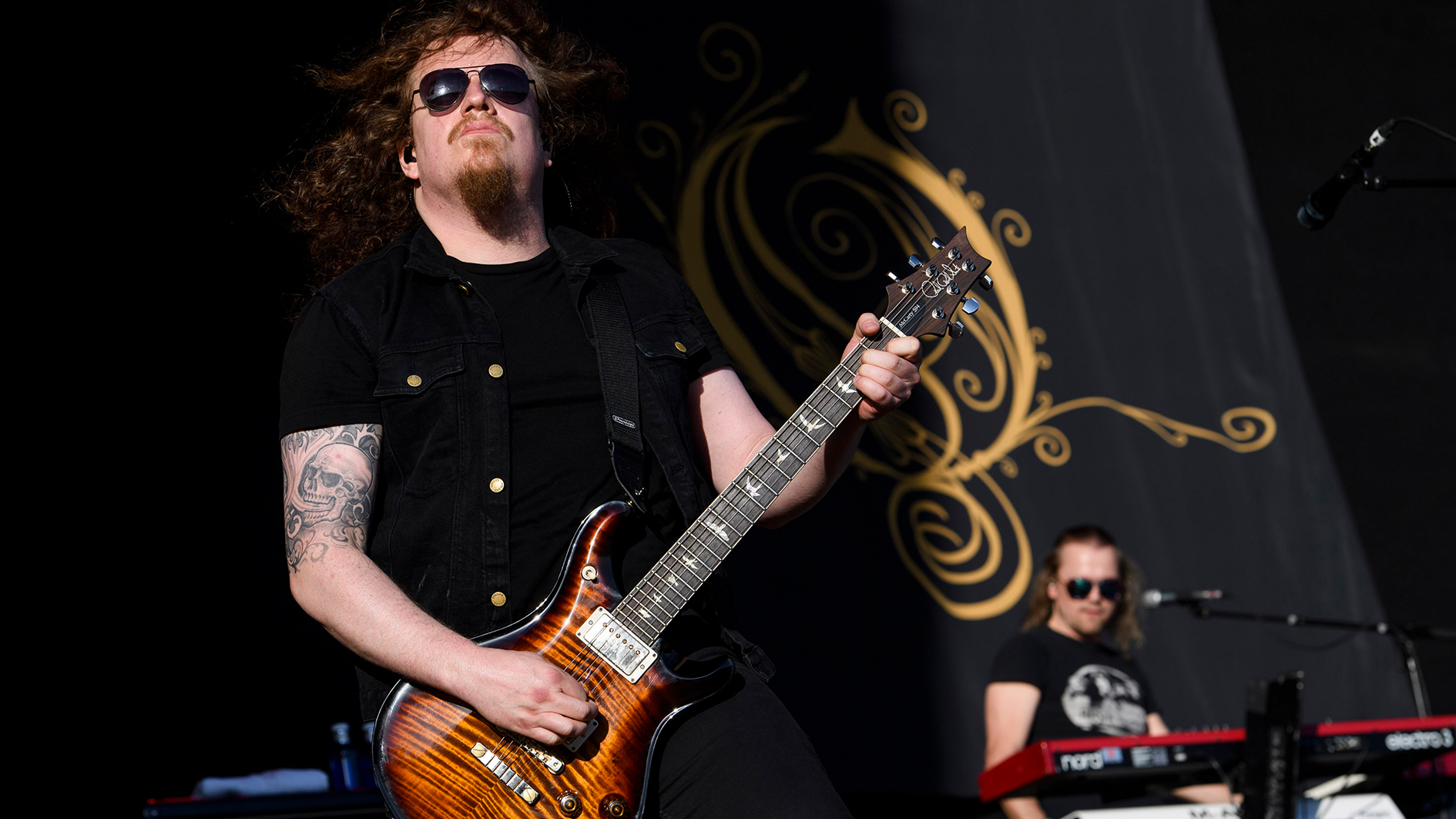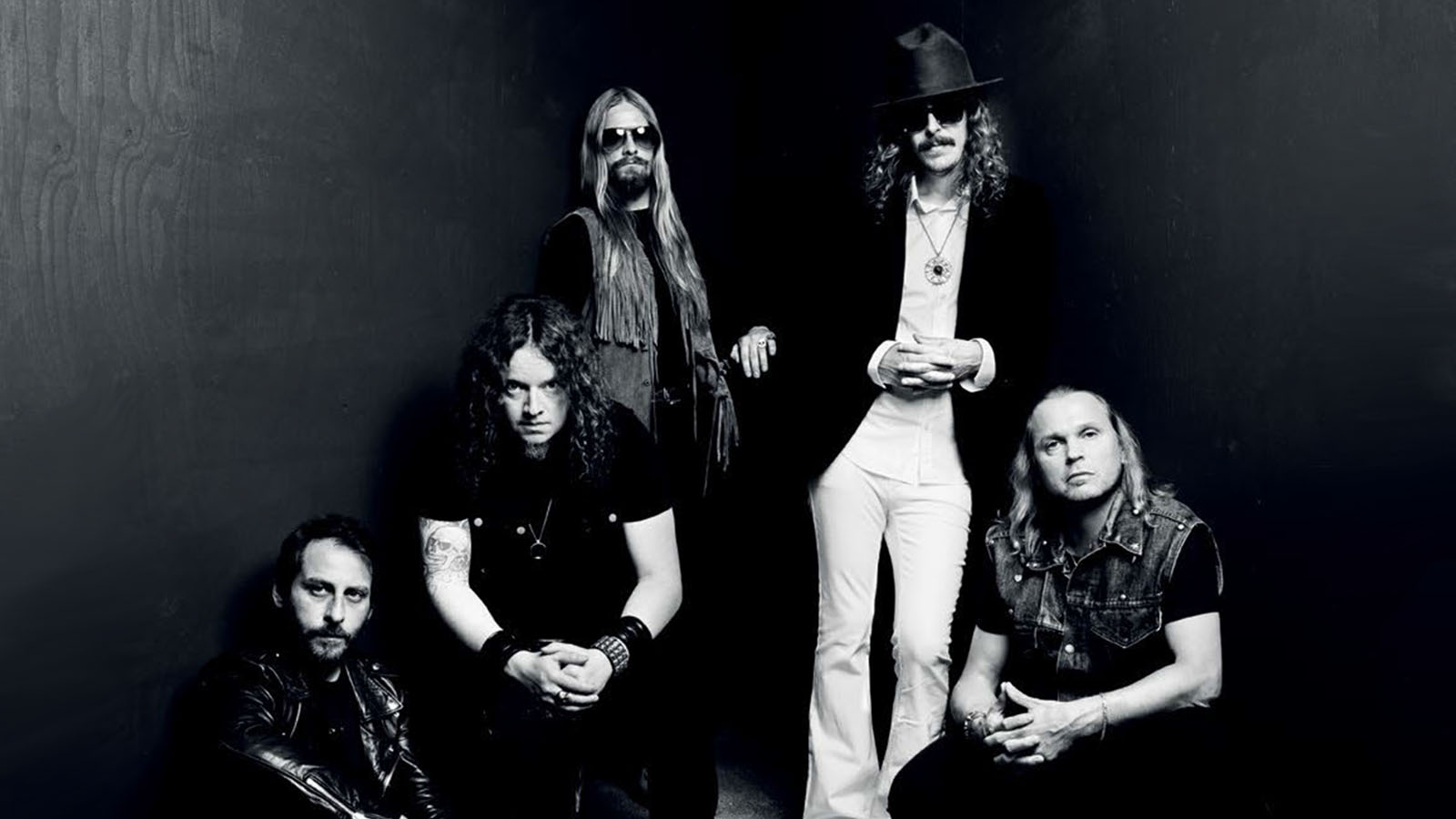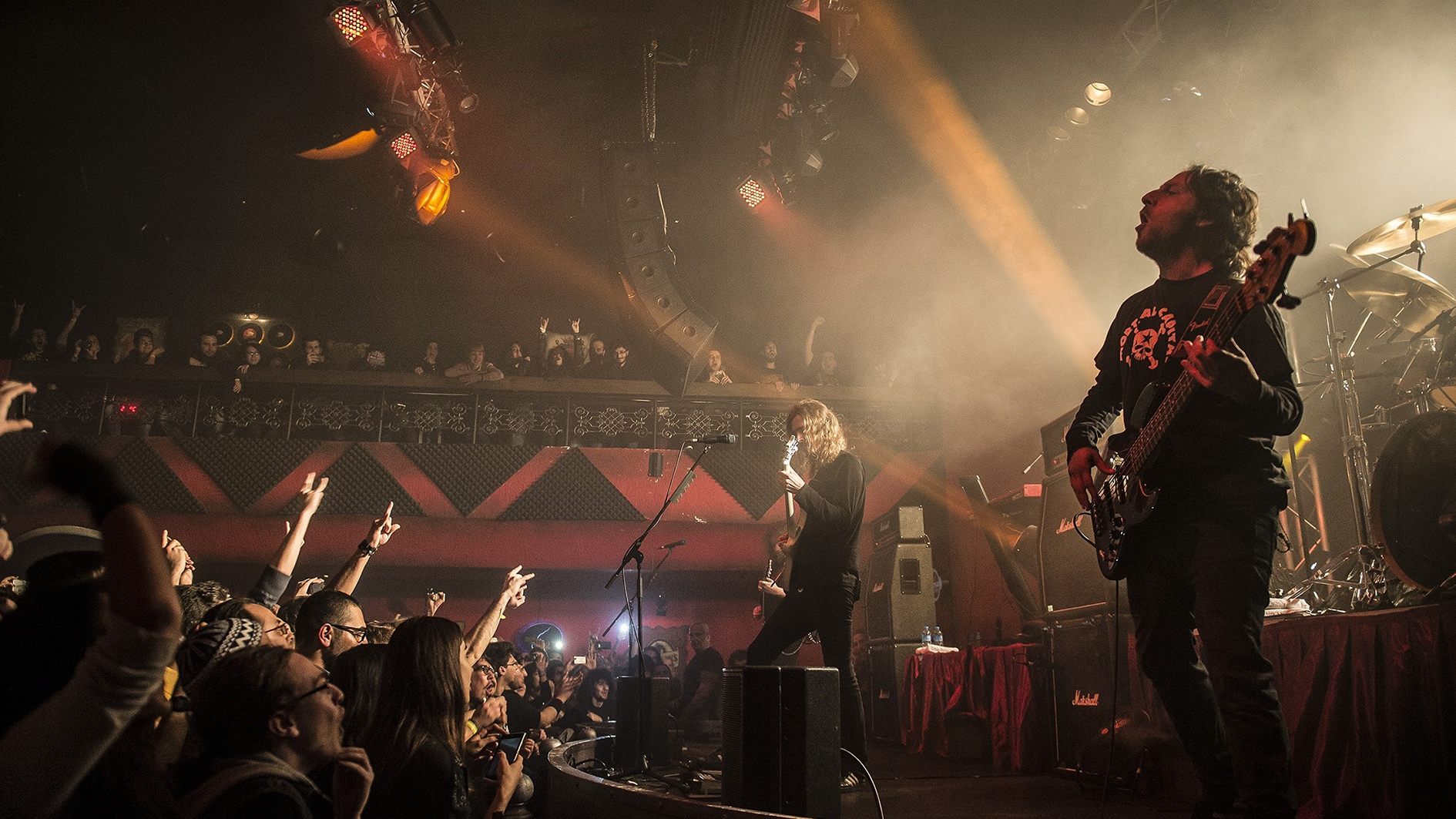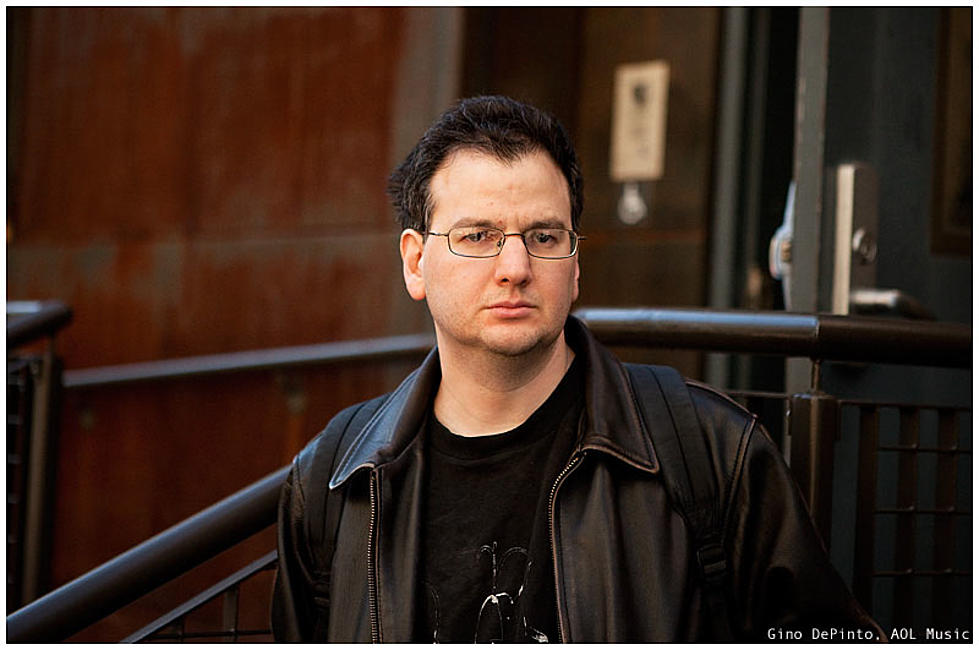Opeth: "Prog-rock has become all about intricate guitar solos and weird time signatures - there's more to us than that"
Mikael Åkerfeldt and Fredrik Åkesson talk gear, jazzy (and folky) influences and In Cauda Venenum, the band’s poignant, personal and ripping new album
![Opeth’s Fredrik Åkesson [left] and Mikael Åkerfeldt with their PRS axes](https://cdn.mos.cms.futurecdn.net/GNc8XHy7aLrpLDh3ABJB5G.jpg)
With his two daughters, 15-year-old Melinda and 12-year-old Mirjam, in the back seat of his car, Opeth founder Mikael Åkerfeldt was more concerned about getting his kids to school on time than he was in mapping out the band’s 13th studio album.
It was a frigid December morning before 8am in Stockholm, and right after he dropped his children off he headed to his rehearsal space, where he planned to woodshed some parts he had written. As he sat at a red light, a thought rang through his mind. “What if we do the entire album in Swedish?”
Åkerfeldt chuckled at the idea. He wrote all of the band’s other songs in English and he loved the poetic flow of the language - even back in Opeth’s early days in the mid to late '90s when he growled his vocals and the band’s music was largely influenced by death and black metal.
These days, Opeth are far more firmly rooted in textural progressive hard rock, colored with strings, keyboards and samples. But the impetus for creation remains the same as it was when Opeth worked on their groundbreaking 1995 death metal album, Orchid.
Consistency is far less significant than creativity. Musical motifs have remained throughout the decades (long songs, brooding atmospheres), but Åkerfeldt has insisted Opeth evolve and change at least slightly with each release.
The guitarist and vocalist admits that, at first, it seemed silly to try to write an album in Swedish, especially since English is the universal language of nearly all rock music. But the more he thought about it, the more he liked the idea.
“I figured, ‘Why not?’” Åkerfeldt tells us. “I’ve never done it and it sounds like fun. Let’s do that.”
Get The Pick Newsletter
All the latest guitar news, interviews, lessons, reviews, deals and more, direct to your inbox!
I could never really understand mental illness until it happened to me. I was like, ‘I feel like shit just because of what’s going on in my mind?’
A powerful by-product came with the new format. Åkerfeldt discovered that when he worked in Swedish, his lyrics were less flowery and far more personal than when he sang in English. He wrote about his divorce from his first wife Anna and the pain it caused his family, the transitory nature of time and the depression he suffered after his divorce.
“I didn’t only divorce my wife,” he says. “I divorced my kids 50 percent of the time because my ex and I share custody. Also, I had to find a new place to live, and all the change was very horrendous for me. I was literally pulling my hair and I realized I needed to go into therapy to deal with depression and anxiety. I only did about 10 sessions of cognitive therapy and I was able to work out a lot of issues.
But I could never really understand mental illness until it happened to me. I was like, ‘Whoa, what’s going on? I feel like shit just because of what’s going on in my mind?’”
![[From left] Fredrik Åkesson, Joakim Svalberg, Mikael Åkerfeldt, Martín Méndez and Martin Axenrot](https://cdn.mos.cms.futurecdn.net/B2dnimGsmhGRSAwEZ2YEwc.jpg)
The more personal Åkerfeldt’s lyrics became, the more emotional expression filtered into the music. Opeth’s new album, In Cauda Venenum (Latin for "the poison is in the tail”), conveys Åkerfeldt’s sensitivity and discovery with an abundance of melancholy arpeggios and fingerpicked solos, yearning strings, piano and pensive tenor vocals and operatic frills.
The tender passages are balanced by more energized but equally conflicted bursts of distorted guitar, keening keys, meandering bass and battering drums reminiscent of Seventies prog bands such as King Crimson and Yes, but with the psychedelic flair that puts us in mind of Pink Floyd and German Krautrock band Amon Düül II. The different sonic landscapes are alternately grandiose and cinematic, jittery and claustrophobic, delicate and heartbreaking.
“My favorite type of music is the stuff that could potentially make me cry,” Åkerfeldt says. “I love prog rock, but when there’s too much intricate showmanship, the music doesn’t make me feel anything. If I write a piece of music and it doesn’t hit my emotions, it doesn’t matter how good it is. I delete it and try again. That happens a lot.”

Not only is Åkerfeldt a perfectionist, he’s a bit of a control freak and extremely guarded about all the songs on In Cauda Venunum, which have been released in both Swedish and English versions.
“This time I was ruthless. I focused intently on what I love - not what the band likes or what people think we’re supposed to be,” he says. “On the last album [2016’s Sorceress], there were a couple moments where I thought to myself, ‘Hey, let me write something the guys like playing.’ I loved it, too, but the first goal was to please them.
"This time, I was a complete narcissist. That’s why it’s more of an emotional record and the song arrangements are more elaborate and eclectic. It was about what sounded good to me.”
For the past 12 years, Opeth’s not-so-secret weapon has been lead guitarist Fredrik Åkesson, who previously played with Arch Enemy from 2005 to 2007. In addition to tracking almost all of the band’s electric guitar solos, Åkesson added shade and dimension to the rhythms and helped guide Åkerfeldt when he was trying to decide what chords worked best in a given song.

So, after he demoed the tracks he played them to Åkesson for feedback. “Whenever I presented a song to him, he was like, ‘That’s cool. That’s awesome. Is there a guitar solo?’” Åkerfeldt says, then laughs. “I said, ‘You know what? There are lots of guitar solos.’ But I never catered to Fredrik. The solos are there because the songs needed them.”
When he wrote his leads for the demos, Åkesson let loose, playing parts that were slow and reflective like Pink Floyd’s David Gilmour as well as faster legato lines reminiscent of Deep Purple’s Ritchie Blackmore.
Mikael said to me, ‘When you die, I want people to remember you through this solo. I was like, ‘Thanks, man. Thanks for the pressure
Fredrik Åkesson
“At one point, I told Fredrik, ‘OK, now is the time for a really fast arpeggio run,’ and he reacted, ‘What?! Did you just say what I thought you said?’ He was smiling and happy, which was awesome.”
“When I was about to record the lead for Minnets yta (Lovelorn Crime),’ Mikael said to me, ‘When you die, I want people to remember you through this solo,’” Åkesson says. “I was like, ‘Thanks, man. Thanks for the pressure.’”
Åkesson started taking guitar lessons at 12 years old and is skilled in music theory and composition. His earliest influences were Deep Purple, early Rainbow, Black Sabbath, Ozzy Osbourne, Gary Moore, Uli Jon Roth, Michael Schenker, Frank Marino, Jeff Beck and Yngwie Malmsteen, and he played his first live gig at 19 when he was in Talisman, which featured two future members of Yngwie Malmsteen’s Rising Force.
He played thrash, death metal and neo-classical guitar in various bands, and when longtime guitarist Peter Lindgren left Opeth in 2007, Åkesson enthusiastically jumped onboard.

“I’ve been lucky to play all sorts of different genres over the years and I think that helps a lot with what I do in Opeth,” he says. “Of course, I love to go off and shred, but I think the goal with a good prog band is to do something musical. It’s like putting salt on your food. If you have just the right amount it tastes great, but if you put too much on, you ruin it.”
Åkerfeldt started playing professionally at 14 in the Swedish death metal band Eruption in 1987. After the band dissolved in 1990, he joined Opeth, first on bass, then on guitar and vocals. One of the most impressive aspects of Åkerfeldt’s songwriting is that he doesn’t always know exactly what he’s doing. Since he’s completely self-taught and doesn’t read music, he writes entirely from intuition and strives to replicate what he hears in his head.
I don’t know any kind of theory and I only taught myself to pick the guitar with three fingers, but that seems to be good enough for what I want to do
Mikael Åkerfeldt
“For me,” he continues, “it’s all about trial and error - experimenting with different things to see what sounds good. The same goes for acoustic arpeggios and fingerpicking. I don’t know any kind of theory and I only taught myself to pick the guitar with three fingers, but that seems to be good enough for what I want to do.”
“I’m always amazed by Mikael because he doesn’t know anything about modes and scales,” Åkesson says. “Yet he mixes modes and scales a lot in his riffs. One riff could consist of three different modes. It’s all in his head, which is pretty cool. Maybe that’s why he comes up with a lot of original stuff because he doesn’t really know what he’s doing, but in his own way he definitely knows what he’s doing.”
Åkerfeldt has compensated for his lack of formal musical training by thoroughly absorbing the music he loves to compulsively listen to and then tracing back the lineage of the various genres to their roots. To date, he has done this with metal, prog, doom, folk, classic rock, soundtrack music and, most recently, a little jazz.
“Perhaps the one biggest influence on me in the last five years is a Swedish trumpeter named Lars Färnlöf, who did the score for the late-Sixties B-movie thriller The Chameleon,” Åkerfeldt reveals. “He wrote the score and hired the crème de la crème of the Swedish jazz scene to play on it, and it’s one of the most beautiful records I’ve ever heard in my life. That kind of sound rubbed off on me on songs like Banemannen (The Garroter).”
Another major discovery for Åkerfeldt was the string arrangements of Philamore Lincoln, a relatively obscure songwriter who released one album, The North Wind Blew South, in 1970. “The North Wind Blew South is monumentally beautiful,” he says. “The strings on that record took me to another place.”
As musically obsessed as he is, Åkerfeldt stopped buying albums that were released after 1976, partly since that was when punk rock became popular, which, to Åkerfeldt, was a bad omen. Despite the '60s vibes of In Cauda Venenum, there are modern touches.
The first song, Livets trädgård (Garden of Earthly Delights), starts with a choir, haunting keyboards and ambient electronic passages that could be mistaken for The Orb. Yet Åkerfeldt’s interest in electronic music begins and ends with Tangerine Dream and Kraftwerk.
The term prog rock has become a style now that doesn’t necessarily refer to music that’s progressing. It’s all about intricate guitar solos and lots of noodling and weird time signatures
Mikael Åkerfeldt
That explains, in part, why Opeth, though innovative and inspiring, rarely sound truly modern. They just prefer to do brand-new things with old sounds.
“That’s true,” Åkerfeldt agrees. “But it would be quite misleading to think of Opeth as just a prog band.
“The term prog-rock has become a style now that doesn’t necessarily refer to music that’s progressing. It’s all about intricate guitar solos and lots of noodling and weird time signatures. We love some of that stuff and we have long songs too, but there’s more to us. There are so many other styles of music we draw from.”
Åkerfeldt wrote and demoed In Cauda Venenum at his own Junkyard Studio (which doubles as the band’s practice space) between January 2018 and the end of the year. He worked on one song at a time until he hit an obstacle. Then, instead of trying to plow through the impasse, he started another track until he got stuck on that one.
Whenever he was inspired, he switched back and forth between songs. Sometimes, he worked on as many as three tracks at once. Some, including the reverie-inspiring Ingen sanning är allas (Universal Truth), took more than a month to complete.
Others, including the somber Minnets yta (Lovelorn Crime) and the luminous, ethereal Allting tar slut (All Things Will Pass), were written from start to finish in a day.
“Maybe that doesn’t happen with all the more elaborate pieces,” Åkerfeldt says. “But sometimes everything floods out naturally. Some people will thank God for it, but I don’t really know where it comes from, but it’s natural, so I don’t question the process.”
For the most part, the creative process for In Cauda Venenum was much the same as the formula that Opeth have been following for years, but with one key exception. After Åkerfeldt finished writing, the rest of the band diligently rehearsed the album together before they went into the studio.
“We hadn’t done that since [2008’s] Watershed,” Åkesson explains. “I think it was great to do that because everybody had their parts down to muscle memory by the time we recorded.”
The change in protocol gave the guitarists more time experimenting with different equipment. Park Studios was a true gear lover’s paradise. The band recorded on a Sixties EMI TG12345 console from the hallowed Abbey Road Studios and a Neve 8058 board similar to the one at New York’s Electric Lady Studios.
For amps, Opeth tried out some Marshalls and Friedmans but opted for an Olsson 100-watt custom-built prototype amp by an engineer who lives near Åkesson.
“We used it for everything. We even played bass through it,” Åkerfeldt says. “The song Charlatan is just three bass guitars, and we kind of blew some of the power tubes on the Olsson. We tried using it again for the next song and it simply didn’t sound as good.”
We recorded all the reverb and the other effects when we did the basic tracks, so we couldn’t go back and change our minds afterwards.
Mikael Åkerfeldt
Park Studios also had an abundance of guitars. Åkerfeldt chose a ’72 Strat with a rosewood neck, and Åkesson went with a ’72 Strat with a maple neck. Opeth also used the following: a ’79 Gibson Flying V, ’77 Gibson Black Beauty Les Paul, ’58 Gibson SG, ’65 Gibson SG Junior, ’58 Fender Sunburst Strat, Sixties Fender Jaguar, Sixties Gretsch Bullet, a Junior and some new PRS guitars.
The PRS models included the Mark Tremonti Signature, the JA-15 jazz hollowbody, the Angelus, the P22, P24, the 594 Blackgold and the SC245. Many of the guitars were customized with humbuckers; for the heavy passages, Åkerfeldt doubled single-coil P90s with the humbuckers to provide extra depth. Opeth also toyed with various effects.
“We do a lot to try to find cool sounds,” Åkerfeldt continues. “I’m a sucker for spring reverbs. The record is bathing in that sound. And we also used [MXR] Carbon Copy analog delays.

We recorded all the reverb and the other effects [including an MXR Phase 90, Univox Super Fuzz, Dunlop Blue Silicon Fuzz Face and EarthQuaker Hoof and Tone Reaper pedals with oldschool analog octave up] when we did the basic tracks, so we couldn’t go back and change our minds afterwards. We recorded using Pro Tools, but no effects were added after the rhythms were recorded.”
Åkerfeldt and Åkesson tracked all of the electric rhythms before Åkerfeldt added all of the acoustic parts using a Martin, an old Bjärton and even a Levin Lute Guitar.
“As far as my acoustic guitar influences go, I’m really into the older folk singer-songwriters like Bert Jansch from Pentangle, who experimented a lot with open tuning and was a great finger picker. He, in turn, also inspired people like Jimmy Page and Nick Drake, both of whom I love.”
I get so used to the versions on the demos that I usually just pimp them up and tighten them just a little bit
Fredrik Åkesson
For leads, Åkesson mostly played a PRS P24 and P245, but he also used the Flying V for the heaviest parts. With few exceptions, he replicated solos he recorded for the demos and finished tracking in seven hours.
“I always go in with the mindset that I’m going to redo all the demo solos for the album,” Åkesson says. “I want to do something fantastic, but I get so used to the versions on the demos that I usually just pimp them up and tighten them just a little bit.”
Åkerfeldt and Åkesson used to fly around with a mountain of costly gear; these days, like folk hero Jansch, they’re traveling light. On the road, Åkerfeldt carries three PRS P24s with piezo bridges and a PRS McCarty II while Åkesson relies on his grey-black P245 and the SC245.
Officially, Opeth are still endorsed by Marshall; however, Akerfeldt and Akesson have been using a Synergy amp system for much of the past year. Their go-to setup uses Marshall 800 and Soldano modules plugged into a Friedman amp.
“I can do everything with it,” Åkerfeldt says. “I use one heavy rhythm guitar sound, one heavy lead guitar sound, one softer distorted sound that I call the old man’s rock sound, one clean electric sound with string reverb and echo and one piezo sound. And, to me, it sounds way more realistic than amp modelers because it’s the real thing.”
With the release of In Cauda Venenum, Opeth have passed yet another career landmark, creating heartfelt, confessional Swedish and English versions of a modern prog album filled with superlative songwriting and exceptional playing.
Originally, Åkerfeldt didn’t plan to record an English version, but he didn’t want English-speaking fans to feel alienated, so after he finished the Swedish version he transposed the lyrics into English and recorded the vocals. Rather than viewing the move as a compromise, Åkerfeldt sees it as a gesture to fans who want to listen to the album but favor English lyrics.
13 albums into their career, Opeth fill venues across the world and play priority slots at big festivals. For Åkerfeldt, that’s just fine. He once strived to get more and more popular with every release; now he’s content to play to the music he loves to dedicated fans.
“I wouldn’t mind if we got as big as Tool, but I don’t have those aspirations,” he says. “I believe it can taint the music to have those aspirations, and that ulterior motive is a bit ugly to me. To play in front of a thousand people is all I need - or 500, for that matter, or 20. If someone comes and watches us, I’m happy. But I wouldn’t adjust the music to cater to bigger audience. That would be the death of this band.”
Jon is an author, journalist, and podcaster who recently wrote and hosted the first 12-episode season of the acclaimed Backstaged: The Devil in Metal, an exclusive from Diversion Podcasts/iHeart. He is also the primary author of the popular Louder Than Hell: The Definitive Oral History of Metal and the sole author of Raising Hell: Backstage Tales From the Lives of Metal Legends. In addition, he co-wrote I'm the Man: The Story of That Guy From Anthrax (with Scott Ian), Ministry: The Lost Gospels According to Al Jourgensen (with Al Jourgensen), and My Riot: Agnostic Front, Grit, Guts & Glory (with Roger Miret). Wiederhorn has worked on staff as an associate editor for Rolling Stone, Executive Editor of Guitar Magazine, and senior writer for MTV News. His work has also appeared in Spin, Entertainment Weekly, Yahoo.com, Revolver, Inked, Loudwire.com and other publications and websites.
“The main acoustic is a $100 Fender – the strings were super-old and dusty. We hate new strings!” Meet Great Grandpa, the unpredictable indie rockers making epic anthems with cheap acoustics – and recording guitars like a Queens of the Stone Age drummer
“You can almost hear the music in your head when looking at these photos”: How legendary photographer Jim Marshall captured the essence of the Grateful Dead and documented the rise of the ultimate jam band

![A black-and-white action shot of Sergeant Thunderhoof perform live: [from left] Mark Sayer, Dan Flitcroft, Jim Camp and Josh Gallop](https://cdn.mos.cms.futurecdn.net/am3UhJbsxAE239XRRZ8zC8.jpg)









